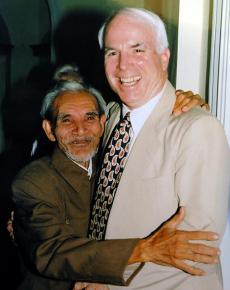The man who saved McCain
John McCain wouldn’t have had a political career were it not for the Vietnamese civilian who rescued him in 1967.
JOHN MCCAIN'S Skyhawk was shot down over Hanoi on October 26, 1967, as he prepared to release his bombs on the city below. He parachuted into Truc Boch Lake. Mai Van On waded into the water, hauled him to safety and then, with the help of a neighbor, defended the airman from locals intent on doing him further damage.
Nearly three decades later, in 1996, a meeting was organized in the city between McCain and On. McCain was photographed embracing his rescuer, whom he presented with a badge in the form of the Senate seal.
In 1999, preparing for his 2000 tilt at the presidency, McCain published an autobiography, Faith of Our Fathers, containing a detailed account of his capture. But there was no mention of Vietnamese civilians coming to his assistance and saving his life.
The Hanoi reunion had been organized by Chuck Searcy, then working in Hanoi for the Vietnam Veterans' Memorial Fund. He says:
In 1995, Mr. On gave me a letter he wanted me to deliver to McCain. It said, 'I am the guy who pulled you out of the lake, and I have followed your progress over the years. I wish the best for you and your family, and I hope some day you will be president of the United States.' I thought it was endearing. I sent the letter to McCain's office, and I got back a sniffy response saying, 'Mr. McCain isn't interested in these fanciful stories.'"

Searcy decided to investigate On's story anyway. "I asked the neighbors around the lake if it was true, and they said that was exactly how it happened," Searcy said. "The story was also confirmed by the Vietnamese government."
Sometime later, Searcy met McCain at a veterans' reunion: "I mentioned the story of Mr. On to him, and told him it was true. He said, 'Hell, I would like to meet this guy.'"
McCain was then involved in facilitating the entry of U.S. companies into the Vietnamese market--to the extent that he was accused by one veterans' group of being a "communist dupe." The pictures of himself and On beaming from the front of Vietnamese newspapers, did no harm to these efforts.
Searcy recalls the meeting:
Mr. On was a wiry little guy. He looked as if he had only ever shaved once or twice, and he had his old uniform on. He raced up to McCain and kept repeating his name as he embraced him. Then, through an interpreter, he recounted the events of that day as McCain listened.
He launched into a very emotional description. Suddenly, they saw this parachute coming down into their small lake. Everybody was afraid because they knew it was an American pilot, and they didn't know what to do. He said he just instinctively grabbed this big bamboo log, and threw it into the water and jumped in after it. One of his neighbors joined him, and the two of them swam out to the parachute. Apparently, McCain had broken both arms and one leg, and had sunk to the bottom, but they pulled him out of the lake."
When they got to the bank, a couple of men attacked McCain, breaking his shoulder with a rifle butt and stabbing his leg, before Mr. On stopped them. According to Searcy:
McCain listened but there was no dramatic response. He just nodded, said, 'Thank you very much,' and gave Mr. On a little Senate seal. It was the kind of thing you buy for a dollar in the souvenir shop in the Senate basement. But Mr. On, to the day he died, treated it as if it were a Congressional Medal of Honor."
Mr. On's son-in-law, Nguyen Ngoc Toan, says: "Before he died, he told us not to sell the medal Mr. McCain gave him. He said, 'If any of the grandchildren ever go to America, having it might help them.'"
McCAIN WAS badly treated when brought to Hoa Lo jail (the "Hanoi Hilton"). But whether the treatment amounted to torture is open to question. Hoa Lo wasn't Abu Ghraib. He wasn't dressed in a jumpsuit with his appendages, hooked up to the main lines.
In an article written in 1973, McCain himself described being slapped around for "three or four days" by jailers demanding information. On the fourth day, McCain recalled, he called for an officer and told him, "O.K., I'll give you military information if you will take me to the hospital...Eventually, I gave them my ship's name and squadron number, and confirmed that my target had been the power plant."
He was taken to hospital and nursed back to health. We might wonder in passing whether a foreign fighter captured in the act of bombing a U.S. city would fare so well, at the hands of either civilians or security forces.
McCain's time as a prisoner of war will have been no fun at all. But its inclusion on his record has been hugely helpful to his political career and may be a factor, come November, in carrying him all the way to the White House.
Of course, he wouldn't have had a political career had it not been for Mr. On. But it wouldn't have done to mention any of that at the Republican National Convention in Minneapolis. Might have given the wrong impression altogether.
First published in the Belfast Telegraph.


